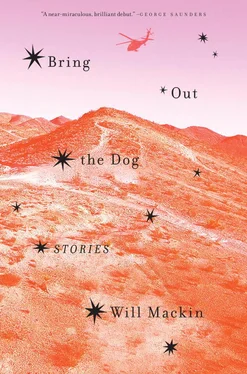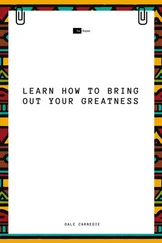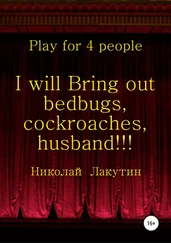Will Mackin - Bring Out the Dog
Здесь есть возможность читать онлайн «Will Mackin - Bring Out the Dog» весь текст электронной книги совершенно бесплатно (целиком полную версию без сокращений). В некоторых случаях можно слушать аудио, скачать через торрент в формате fb2 и присутствует краткое содержание. Город: New York, Год выпуска: 2018, ISBN: 2018, Издательство: Random House Publishing Group, Жанр: prose_military, на английском языке. Описание произведения, (предисловие) а так же отзывы посетителей доступны на портале библиотеки ЛибКат.
- Название:Bring Out the Dog
- Автор:
- Издательство:Random House Publishing Group
- Жанр:
- Год:2018
- Город:New York
- ISBN:978-0-812-99564-0
- Рейтинг книги:5 / 5. Голосов: 1
-
Избранное:Добавить в избранное
- Отзывы:
-
Ваша оценка:
- 100
- 1
- 2
- 3
- 4
- 5
Bring Out the Dog: краткое содержание, описание и аннотация
Предлагаем к чтению аннотацию, описание, краткое содержание или предисловие (зависит от того, что написал сам автор книги «Bring Out the Dog»). Если вы не нашли необходимую информацию о книге — напишите в комментариях, мы постараемся отыскать её.
Bring Out the Dog — читать онлайн бесплатно полную книгу (весь текст) целиком
Ниже представлен текст книги, разбитый по страницам. Система сохранения места последней прочитанной страницы, позволяет с удобством читать онлайн бесплатно книгу «Bring Out the Dog», без необходимости каждый раз заново искать на чём Вы остановились. Поставьте закладку, и сможете в любой момент перейти на страницу, на которой закончили чтение.
Интервал:
Закладка:
I was at the center of the single-file formation, following Big Country with his M60 slung over his chest, and belts of seven-six-two crossed on his back. Big Country followed Hal, who followed Goon, and so on up to Able and Mir. Frank walked behind me. Descending through the foothills, we passed caves that tunneled deep into the mountains, and wide-open shafts that dropped a hundred feet to underground canals. Wild dogs perched on ridgelines. Meanwhile, rocks gave way to stones, and stones to dirt. The dirt ended in a tall cornfield.
We didn’t know what was hidden in the corn, so Able unleashed Mir, and Mir slipped into the crop at a sprint. He ran a search pattern—visible in the shaking tassels, audible in the torn leaves—of ever-widening scope. When we were no longer able to see or hear Mir running through the corn, Hal signaled: Move. We entered the cornfield on a tractor path that started out wide and flat but soon became narrow and rutted. Corn closed in on either side, bending to touch overhead. On a long thin curve, I lost sight of Big Country and Frank. I continued on course, or what I thought was on course. After it seemed like I’d walked a full circle, the path turned the other way; then the path became less of a path and more like the space between stalks.
I stopped walking, shut my eyes, and listened. I felt the separation between my troopmates and me increasing. The part of me that was always telling myself that I didn’t belong, that I’d never belong, whispered those things to me. The wind died down, the corn fell still. Stars jumbled overhead. I considered breaking radio silence, disrupting the mission, exposing us to detection and possible attack. Then I heard something running at me through the corn.
I stared through the goggles in the direction of the noise. The corn was diseased. The thermal image of blight was an effervescent black. Whatever was running my way was not human. I felt its charge reverberate in the ground. It seemed too big to be Mir, but then again, I’d never been on this end of his attack. I took a knee in the mud and tried to remember Mir’s safe word— Lollipop? Oklahoma? I raised my rifle to my cheek. A switch on the front grip activated both the infrared floodlight and the laser. A switch on the trigger grip released the safety. I stared through one night-vision tube, and through my holographic sight, into the corn. The laser dazzled at the center of the infrared beam, creating the impression of a portal between worlds, through which I might escape. Metal warmed against my cheek. I took the slack out of the trigger, gently. I tried not to think. Then Mir appeared: wild, shining, suspended like a quicksilver dog. Splashing off a mud puddle, he turned away.
I flipped the safety on and lowered my rifle. I stood, and walked toward the river. Still lost, I found myself at the edge of an open field, where crows were propped like suitcases amid rows of stubble. Spotting one of my teammates on the opposite side of the field, I reached for an IR chem light to signal: Friendly. But he cracked his first. And there was Big Country, bathed in infrared waves, holding his chem light like a votive. The image of his face on my night vision alternated between a bronze and a tin mask. His shadow surged over the cornstalks behind him, while the shadows of crows surged my way.
A KNOCK SOUNDED on the plywood door of the hut where the memorial was soon to begin. I opened the door to find a new chaplain standing in the shit rain.
“May I come in?” he asked.
Once inside, the new chaplain wanted to know who I was, and where I was from. I could’ve asked him the same thing. The old chaplain—taller, happier—had shown up at the beginning of deployment to take down our names, points of contact, and next of kin. This information went into a sealed envelope that, the old chaplain had assured us, would be destroyed in the event of our safe return home. Then he’d asked us to bow our heads and pray for our safe returns, which, I remembered thinking, would’ve made me feel like a phony if I’d done it, and would’ve made me feel like an asshole if I hadn’t. This new chaplain, though, didn’t seem like the sort who’d force anybody to pray. In fact, the very idea of prayer seemed to have worn him down. I told him who I was, and where I was from.
“Never been there,” he said.
“You should go sometime,” I said. “There’s a boardwalk with rides,” I continued, leaving out all the fistfights that went on in the parking lots. “And the ocean’s warm in summer.” I failed to mention the trash that occasionally floated ashore. “And there’s this beach where, on the night of a full moon, one wave will leave a million silver minnows flipping in the sand, and the next wave will carry them all back out to sea.”
“Sounds great,” the chaplain said, looking around the plywood hut. “Where do you want me to sit?”
I unfolded three chairs—one for the chaplain, one for Hal, and one for Able—and placed them against the front wall.
“And is there a lectern or some such?” the chaplain asked.
I dragged the podium out from behind a stack of busted swivel chairs in the corner, and I centered it at the front of the room. Taking his place behind the podium, the chaplain looked out at the rows of empty benches. He must’ve imagined the audience, who’d be looking to him for answers.
“So, tell me what happened,” the chaplain said.
I CRACKED MY chem light and shook it. Big Country signaled: Come. I crossed the muddy field, stubble folding under my boots. Crows hopped aside. I felt relieved, even happy. That’s when Mir flew out of the corn, on a white-hot line toward Big Country.
The 60’s muzzle flash resembled an orchid bloom. Mir folded in half. Crows leapt into the air, flapping their huge black wings, as the boom echoed.
“I’M SORRY,” THE chaplain said.
By now my teammates were entering the room, one by one and in pairs, to sit where they always sat—breachers with breachers; snipers behind them; Rangers, minus Big Country, in the back rows. Hal entered, carrying the ammo can that contained Mir’s ashes. He set it on the podium. Able arrived with a plug of chewing tobacco in his lower lip, and a paper cup to spit in. I sat in the middle row. Chuck wandered in and sat next to me.
Chuck was a civilian contractor in his sixties. His last war had been Vietnam, where he’d done PSYOP, which, as far as I could gather from the stories he’d told, had entailed walking through villages naked and unarmed in broad daylight and spray-painting oxen gold. Afterward he’d gone off to a ranch in Texas, where he’d cleared brush, watered cattle, and driven the plow. Now he was our camp commandant, responsible for the day-to-day upkeep of our tiny compound within the larger FOB, and arguably the best one we’d ever had. Because Chuck knew the difference between those things we needed (hot water, clean shitters, 120 VAC) and those things we wanted (NFL cheerleaders, broadband, tins of bear meat) and those things we didn’t even know we wanted.
Chuck leaned over. “Who wants an orange whip?” he whispered.
“Me,” I said.
“We’ll go right after this.”
The ammo can containing Mir’s ashes was decorated with photos. In one, Mir held the windpipe of a barricaded shooter between his jaws. Blood covered his muzzle, thick as paint. Dust caught in the flash on that dark night looked like stars. In another, Mir licked beans from Able’s plate at a barbecue back home in Virginia. In a third photo, taken from Able’s helmet-cam during an assault on a farmhouse outside Shkin, Mir lunged at some poor Taliban who’d just lifted himself from his hiding place in the muck. Who, if I remembered right, managed to sprint a few yards before a hail of bullets twisted him off his feet.
Читать дальшеИнтервал:
Закладка:
Похожие книги на «Bring Out the Dog»
Представляем Вашему вниманию похожие книги на «Bring Out the Dog» списком для выбора. Мы отобрали схожую по названию и смыслу литературу в надежде предоставить читателям больше вариантов отыскать новые, интересные, ещё непрочитанные произведения.
Обсуждение, отзывы о книге «Bring Out the Dog» и просто собственные мнения читателей. Оставьте ваши комментарии, напишите, что Вы думаете о произведении, его смысле или главных героях. Укажите что конкретно понравилось, а что нет, и почему Вы так считаете.












